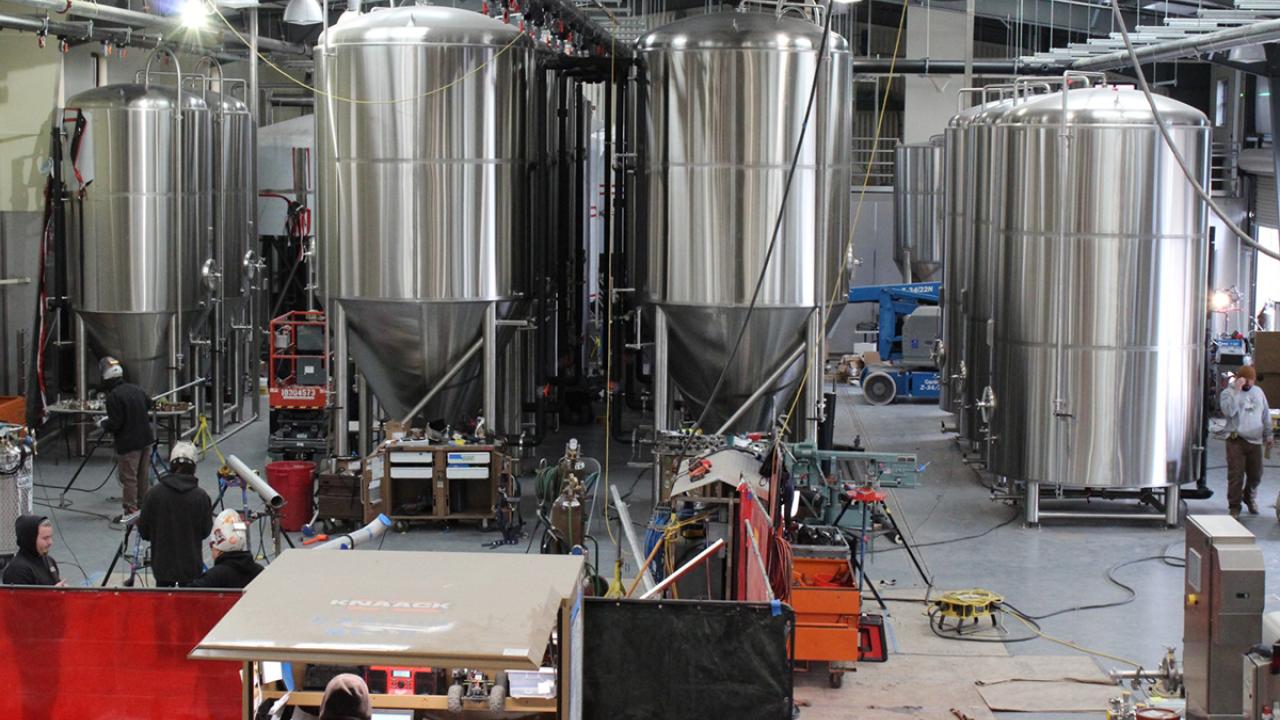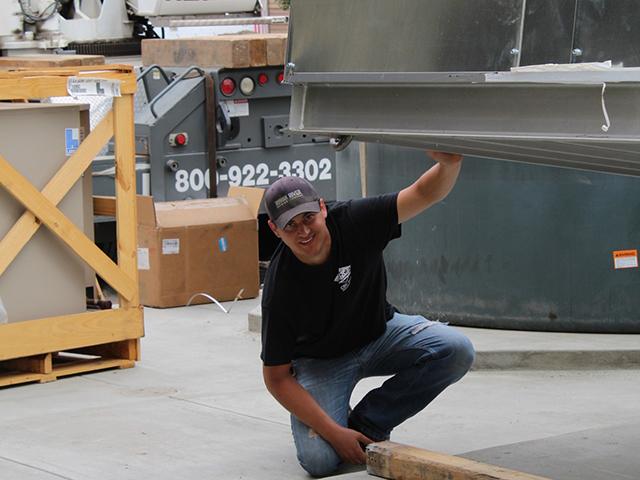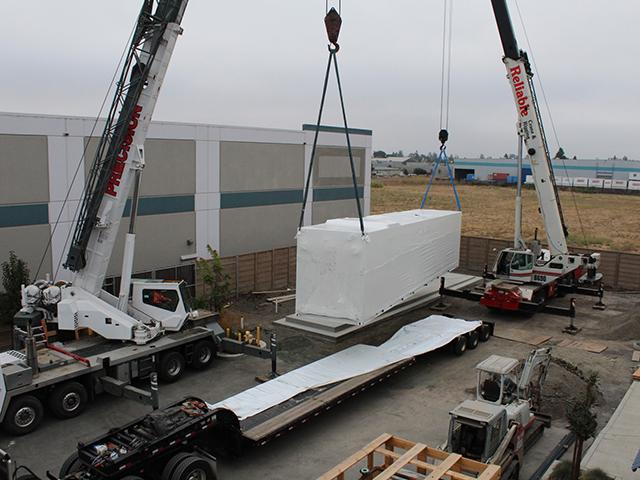
Brewing Green: How Sustainable Brewing Practices are Reshaping the Industry
A Q&A with industry expert Andy Hooper

Craft breweries are rooted in their communities and as such have a deep commitment to the values of those they brew for, including a commitment to sustainability. While beer production can be environmentally costly (think intensive water usage, high energy consumption and CO2 emissions), there are ways to make the brewing process more eco-friendly.
We asked sustainable design and brewing expert Andy Hooper for his advice on how craft breweries can embrace sustainability. A graduate of the UC Davis Master Brewers Certificate Program and former director of operations at Anderson Valley Brewing, Hooper also worked as the brewmaster of Seismic Brewing Company where he designed and built a 13,000 square foot facility with a focus on sustainability, precision brewing, efficiency and automation—making him well versed at implementing and promoting sustainable brewing. Hooper now works in mechanical engineering as the director of business development for Barnum Mechanical Inc. and lectures in the Master Brewers Certificate Program on applied engineering topics with a focus on strategies for improving efficiency.
Sustainability is not altruism; it's just the right way to do things.
Define sustainable brewing and why it matters.
Sustainability in brewing is a reflection of having designed and operated a system intelligently and efficiently. The result of this efficiency is lowered impact on resources like water, power, landfill space, money, employees, etc. but more than that—it's smart business practice and is healthier for the community in which you operate. Sustainability is not altruism; it's just the right way to do things.
What are the challenges of sustainability in brewing?
Potentially the single largest challenge in sustainable brewing is to convince the consumer that it matters. Producing quality and sustainably brewed beer takes more effort and can be more challenging from a logistical and financial perspective. If beer drinkers don't understand or care about sustainability, then brewers have less economic motivation to produce them. In a sea of beer choices with often confusing or misleading value propositions, it can be hard to identify the brewers who are leading the initiative for sustainability.

How can craft brewers adopt sustainable practices?
Start by tackling sustainable efforts which are easily attainable and cost effective such as water use reduction, insulation, operator training and side streaming waste.
As you are able, look at CAPEX (financial expenditure in PPE or property, plant and equipment) upgrades like automation or reclaiming heat, water, CO2 and electricity using specialty equipment. Smart investments in efficient and sustainable PPE will require more CAPEX up front, but ultimately reduce your OPEX (money spent to keep your brewery running, such as overhead costs and maintenance). Buying a solar system is an example of using CAPEX to lower OPEX.
Always follow these efforts up by telling the story so that consumers can celebrate your success and your peers can follow your lead.
Did you know?
Compressed air leaks are a major source of inefficiency. A leak 1/4 an inch in diameter costs $8,240 per year. Fixing air leaks provides the highest payback in the shortest period of time.
Brewers Association Energy Sustainability Manual
How can breweries reduce water usage?
First, investigate how much water you are using and where; the task of optimization is far easier with data. Identify the largest users first, then tackle each area by performing experiments and validating the results. Examples include using different/better sprayballs for CIP in combination with operator training and chemical re-use. If you don't own an automated CIP skid, perhaps these experiments can highlight the potential savings and ROI of purchasing this equipment as you grow. You may also consider technologies to reduce water in packaging such as dry-lubes and ionized air rinsers. Further down the road in your growth trajectory, maybe a full-blown wastewater reclamation system begins to make sense.
What are some other ways we can make brewing more sustainable?
Sideline waste streams into their proper places, including recyclables into their respective bins, spent grains to a composter or farmer and yeast solids to a high-strength treatment facility or biodigester. Reclaim what you can such as water, waste heat and CO2. Purchase or generate renewable energy such as solar, geothermal or wind. Source your raw materials as locally as possible and build relationships with suppliers and farmers to improve quality and align on sustainability values. Constantly assess opportunities to improve, especially if there is a concurrent improvement in cost, safety or employee satisfaction. Dedicate time in staff meetings to discuss sustainability initiatives, which will reinforce its cultural importance to your brewery.


Can you suggest sustainable, money-saving projects for breweries to consider?
- Automation systems for boilers, chillers and air compressors: Steam, cold glycol and compressed air are very costly to generate, so an automated management system can be used to optimize their performance (much like cruise control in a car).
- Insulation: Anything which is hot or cold in a brewery such as tanks and piping should be thoroughly insulated to save electricity and fuel. It should also be done for operator safety and to prevent contamination from mildew growth.
- Water treatment and reclamation: This will depend on the brewery location and the relative cost of fresh water, sewer fees, etc. Water reclamation saves water, but also eliminates sewer or hauling fees. In some cases, it can also produce natural gas, heat and electricity for immediate use by the brewery.
- Heat Reclamation: There are numerous ways to recover heat from brewhouse operations, the most notable of which is reclaiming heat during wort cooling. Another example would be using a kettle stack condenser to reclaim heat from the water evaporated during wort boiling in the kettle.
What do you see for the future of sustainable brewing and how do you plan to be a part of it?
Sustainable technologies like automation are getting more attainable to smaller and smaller brewers. My goal is to continue to educate brewers about the benefits of sustainable brewing practices and be a resource to answer questions or connect people together.
By the Numbers
Electrical energy consumption typically accounts for 70% of a brewery's energy cost. Where's it all going?
- Refrigeration: 35%
- Packaging: 25%
- Compressed air: 10%
- Brewhouse: 7%
- Lighting: 6%
- Boiler house: 5%
- Other: 12%
U.S. Environmental Protection Agency
How can brewers learn more about making brewery operations more sustainable?
Learn from your brewing peers who have been working on this for a long time. Most brewers are an open book, eager to discuss their trade and share ideas. Visit industry-leading breweries to see the technologies and approach in person. Attend industry conferences and seminars that focus on sustainability to hear from subject matter experts. Many will provide contact information so that you can reach out and ask additional questions.
Hear more from Andy Hooper
Check out our Master Brewers Certificate Program. As a lecturer in the program, Andy shares his knowledge on engineering topics relevant to sustainability.
